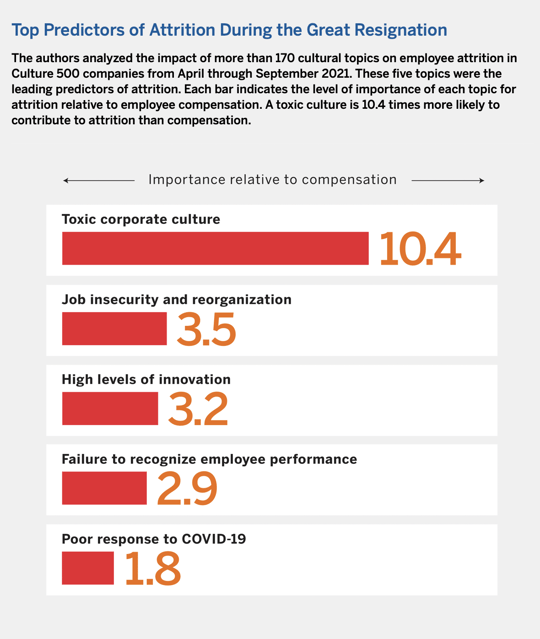Think about the last time you were in the "zone." Accomplishment feels good. Productivity can be motivating. Creativity is energizing. Contributing to the team is rewarding. Sadly, those are distant memories for many workers today and they're heading for the exits.
Over the last six months, countless pieces on the world of work have been authored - many referring to the Great Resignation. Surveys abound to understand what factors are driving the mass exodus as millions of workers leave their jobs leading to staffing shortages and an employee retention crisis.
Much of the discussion has focused on employee dissatisfaction with wages. No one likes to be underpaid. But it turns out people like disrespect and insecurity even less. Toxic corporate culture and poor leadership are more reliable predictors of attrition than compensation.
Arecent MIT Sloan Management Review analyzed 34 million employees and found wages rank 16th among all topics in terms of predicting employee turnover. The figure below displays the five predictors of relative attrition. To give a sense of their relative importance, each element is benchmarked relative to the predictive power of compensation. A toxic corporate culture, for example, is 10.4 times more powerful than compensation in predicting a company’s attrition rate compared with its industry.

- Toxic Corporate Culture: The leading elements contributing to toxic cultures include failure to promote diversity, equity, and inclusion; workers feeling disrespected; and unethical behavior.
- Job Insecurity and Reorganization: Employees are less likely to be loyal to the company through rough patches or even through good times if roles, opportunities for growth, and commitment to the employees are unclear.
- High Levels of Innovation: While innovation can be exciting, it’s also quite stressful. Organizations that lack psychological safety make the risks greater than the rewards.
- Failure to Recognize Employee Performance: The report is clear: “Employees are more likely to leave companies that fail to distinguish between high performers and laggards when it comes to recognition and rewards. Companies that fail to recognize and reward strong performers have higher rates of attrition, and the same is true for employers that tolerate underperformance.”
- Poor Response to COVID-19: Companies that fail to prioritize their employee’s health and well-being will lose more employees.
Our guiding purpose and passions are illuminated like billboards providing inspiration when we're in the zone. But, many of us have experienced what it feels like to slip out of the zone into the grind.... to-do lists growing longer, feeling overwhelmed, overlooked, and unappreciated. The focus gets fuzzy and the bright lights of purpose and passion begin to dim.
We're conditioned to believe that working harder and longer is synonymous with greater productivity and an admirable work ethic. Our current value exchange is time for money. But the more time we put in the less energy we have. Given that the very definition of energy is the capacity to do work, this is twisted logic. If we truly want to achieve and fuel sustainable peak performance, we have to consider a new value exchange. This means learning how to bring more energy to the game. This means actually scheduling time to renew - physically, emotionally, mentally, and spiritually. Step away. Walk around the building. Go for a run. Breathe. Refocus. Meditate. Do what ever it takes for you to refuel both your body and your mind.
The flip side of this is that when we experience personal satisfaction in the work we do, when each day truly contributes to our bigger purpose, we're more energized, more fulfilled...happier. We actually increase our capacity to contribute to personal rewards and organizational goals.
Leaders who cultivate this kind of culture recognize that there are currencies beyond salary, titles and the corner office. They don't take contribution for granted and they don't mistake time for value. They create the conditions necessary for people to work in their performance zone and encourage them to shift to the renewal zone when they need to. These are the leaders who understand the value of recognition and the power of belonging. They know how to empower their people and communicate that what they do truly matters.
This reminds me of something Steve Jobs said in his 2005 Stanford commencement speech:
"Your work is going to fill a large part of your life, and the only way to be truly satisfied is to do what you believe is great work. And the only way to do great work is to love what you do. If you haven't found it yet, keep looking. Don't settle. As with all matters of the heart, you'll know when you find it. And, like any great relationship, it just gets better and better as the years roll on. So keep looking until you find it. Don't settle."
So, the million dollar question is this: Is the life you're living worth the price you're paying for it? Perhaps the millions of employees who have left their positions have answered that question and decided not to settle.
"The minute you settle for less than you deserve, you get less than you settled for." - Maureen Dowd
Perhaps it's time for employees and leaders alike to take inventory of what truly matters. Take a step back and evaluate what you do each day, how it makes you feel, and how what you do makes others feel.
The only way to do great work is to love what you do. The best way to love what you do is to make meaningful contributions to something bigger than you.










